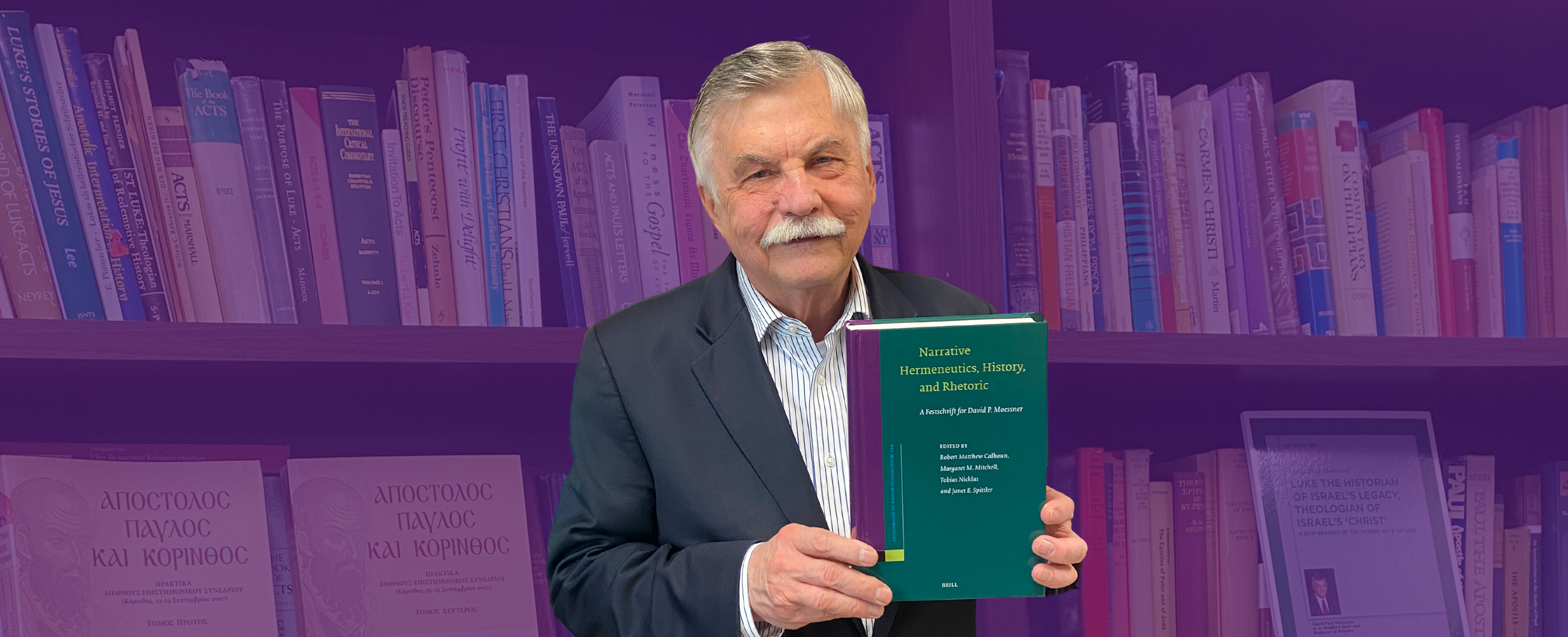Being honored with a Festschrift in academia is rare, which made the recognition all the more surprising and joyful for A.A. Bradford Chair and Professor of Religion David Moessner.
“I was not anticipating this at all,” Moessner said. “As one contributor explained, It’s like being put into the academic Hall of Fame. It doesn’t happen often for professors, and it’s not something every professor expects to receive someday.”
A Festschrift is a collection of writings by authors in the same discipline in honor of a fellow scholar. Colleagues who value the scholar’s work come together to contribute to the project. In Moessner’s case, 21 colleagues and friends from eight countries contributed to the book, a recognition that Moessner said means a great deal to him.
Research: Narrative Hermeneutics, History, and Rhetoric
As the A.A. Bradford Chair and Professor of Religion at TCU, Moessner divides his time between research and teaching. His current research focuses on the concept of narrative, a topic that inspired the title of the Festschrift: Narrative Hermeneutics, History, and Rhetoric: A Festschrift for David P. Moessner.

Contributors to the Festschrift highlighted Moessner’s standing as a leading interpreter of ancient Christian narrative poetics, positioned at the crossroads of Hellenistic Jewish scriptural interpretation and ancient literary criticism.
Moessner’s research was sparked by the fundamental questions: Why were the Gospels in the Bible written as narratives? Why not just lists of Jesus’s sayings or perhaps philosophic treatises of a famous person?
“People think they are just telling a story, but the story involves real people and real events,” Moessner explained. “These narratives were written because their authors were convinced these real people and events are unbelievably important. The early Christians were trying to show who Jesus is, why he’s important and why others should regard him as important.”
At the core, Moessner argues, narrative is a powerful tool for shaping perspectives and understanding one’s place in the world. He believes the Gospels, like other influential narratives, were designed not only to tell a story but also to challenge perspectives, inspire belief, and offer a new way of thinking about life. Their enduring power lies in their ability to invite readers into something deeper and transformative.
Teaching: Inspiring Understanding Through Narrative
Moessner’s insights into narrative not only shape his research but also define his approach to teaching. In the classroom, he encourages students to look beyond the surface of texts, uncovering their depth and complexity.
Since joining TCU in 2012, Moessner has focused on teaching undergraduates, many of whom had never read an entire Gospel or a letter of Paul before taking his class, even if they grew up attending church. He teaches, for example, Jesus and the Gospels, a course in which students explore early Christian texts. Moessner approaches these texts with a scholar’s precision and a pastor’s sensitivity.
“I emphasize how different each narrative is and how the plot is the key to understanding the specific emphases the author is trying to make,” Moessner said. “I love seeing students get excited about ideas when you can see the light bulbs come on.”
This passion for teaching is what drives Moessner’s work in academia, particularly in religious studies. He enjoys collaborating with others and watching his students grow. He also finds encouragement in practicing love and compassion toward others.
“I was once asked if I have a mantra for life,” Moessner said. “To live is to love, and to love is to know God.”
From guiding students in discovering the richness of ancient texts to shaping how people understand the transformative role of stories, Moessner’s work is a testament to the enduring power of narrative. Whether through his research, teaching or the honor of a Festschrift, Moessner’s impact is a reminder that stories have the power not only to inform but also to inspire readers to live and love more deeply.
